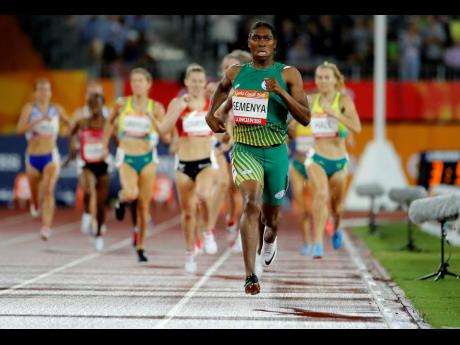Crowne ‘troubled’ by CAS ruling on Semenya
Sports Attorney Dr Emir Crowne disagrees with the Court of Arbitration for Sport’s (CAS) ruling on South African middle-distance runner Caster Semenya.
Yesterday, the CAS upheld a decision made by the IAAF when it ruled that Semenya and other female runners like her, with what is considered unusually high testosterone levels, must take medication to reduce the levels of the hormone. This is to compete in the 400m, as well as middle distance races such as the 800m, and the 1500m.
Semenya was legally recognised at birth as female, but her dominance in the 800m and 1500m events has led to speculation and criticism from many in the athletics fraternity about her sex, gender and whether it is right and fair to have her competing against other women. It presented a difficult ethical situation with a decision from the IAAF meaning either Semenya or her opponents would find themselves in a position of disadvantage. Further, IAAF’s ruling (which it admitted is discriminatory, but says is necessary) requiring Semenya take hormone reducers created questions of human rights violations as some say it has forced her to make a choice between remaining as she was born or suppressing her nature to compete.
Crowne describes the decision as troubling.
“Quite frankly, the IAAF rules pretty much seem to target Caster Semenya,” he told STAR Sports. “The rules are written ‘objectively,’ but the actual substantive effect of the rule is to just target Caster Semenya and Francine Niyonsaba (Burundi 800m runner). I understand that she may also be a hyperandrogenic (having a medical condition characterised by excessive levels of male hormones in the female body). It must be noted that both athletes, black women, achieved great success in their sport, then here comes this rule that says: ‘Oops, sorry, you have too much testosterone, so we’re going to make you medicate to reduce your testosterone. “
Crowne argued that such a ruling is especially unethical as it intrudes on athletes’ personal lives, as it forces them to repress their natural biological composition.
“Now, a sporting body is telling you: ‘Medicate or you can’t play with us,’” he said. “That rule only applies to 400m to one mile races. It doesn’t apply to the 100m, 200m, nor does it apply to races past the 1500m, so it clearly is tailored to those two athletes in particular, and to try to pass it off as being some sort of facially neutral rule is very very problematic.
“The Swiss Federal Tribunal has supervisory jurisdiction over CAS and I hope some appeal is launched to that court.”
Referring to the rule, Niyonsaba said: “For me, it’s about discrimination. It doesn’t make sense. I didn’t choose to be born like this. What am I? I’m created by God.”
Semenya said that while the ruling is difficult to come to terms with, she will aim to overcome it.
“I know that the IAAF’s regulations have always targeted me specifically,” she said in a statement. “For a decade, the IAAF has tried to slow me down, but this has actually made me stronger. The decision of the CAS will not hold me back. I will once again rise above and continue to inspire young women and athletes in South Africa and around the world.”





































